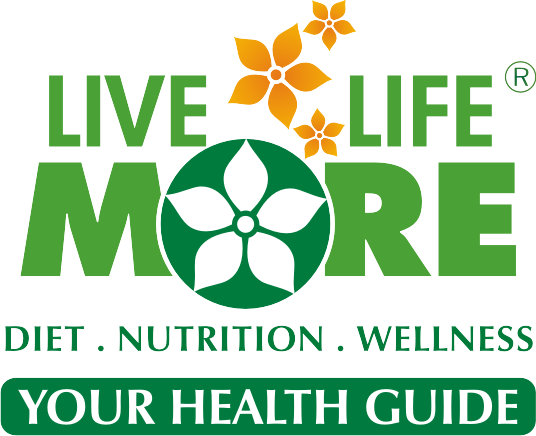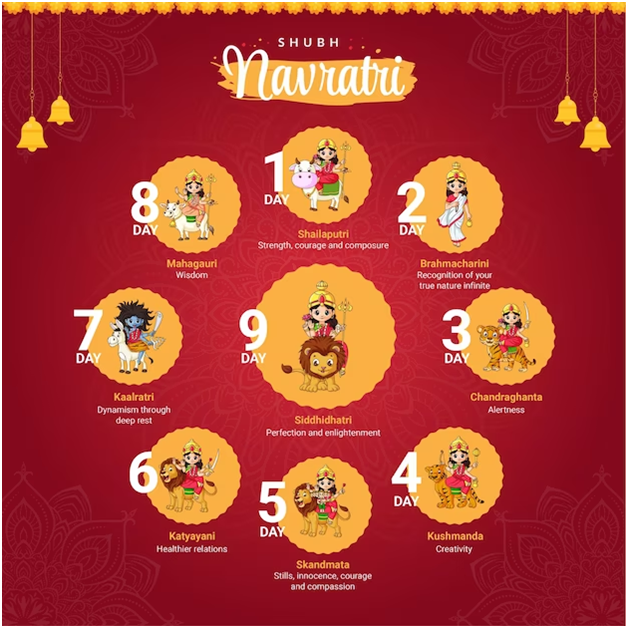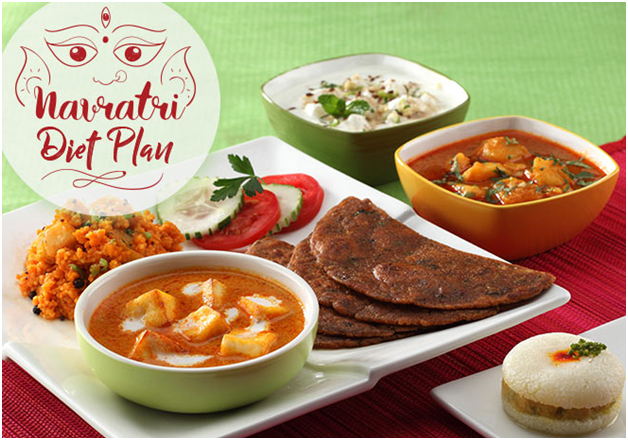Navratri Diet Plan for Weight Loss and Healthy Fasting for 9 Days
The festival of Navratri is not just a spiritual journey but also a time when many devotees opt for fasting. While the primary reason behind the fast is religious, with the right Navratri diet plan, it can also become an excellent opportunity for detoxification, weight loss, and embracing a healthier lifestyle. Additionally, it presents a unique challenge and chance to reboot one’s eating habits, breaking away from routine and exploring nutritious alternatives.
Understanding Navratri Fasting
Before diving into the Navratri diet plan, it’s crucial to understand the essence of this fasting period. Navratri fasting isn’t about starving but about making conscious food choices that can lead to spiritual cleansing and physical well-being. It’s a blend of devotion and discipline, emphasizing purity in the mind and the body. By acknowledging the underlying principles of this fasting, individuals can ensure a fulfilling and health-enhancing experience.
Best Diet to Lose Weight Quickly During Navratri
Opt for Nutritious Substitutes: Instead of consuming traditional fried potato chips or sugary sweets, you can switch to roasted makhana (fox nuts), which are high in protein and low in calories. Additionally, these fox nuts are beneficial for the heart and assist in managing blood sugar, making them a perfect snack during fasting.
Stay Hydrated: Drinking ample water will keep you hydrated and aid in detoxification. Coconut water and lemon water are other healthy alternatives. Staying hydrated keeps you energized and aids in flushing out toxins, ensuring that your skin glows and you feel refreshed throughout the festival.
Include Fruits and Dry Fruits: Eating fruits provides essential vitamins and minerals, giving your body the necessary nutrients while fasting. Including nuts like almonds and walnuts in moderate quantities is beneficial as they are a good source of healthy fats, proteins, and antioxidants, ensuring sustained energy levels.
Protein Intake: Opt for paneer, yogurt, or milk, which are permissible during Navratri and are excellent protein sources. Protein is vital during fasting as it helps maintain muscle mass, ensuring that weight loss is healthy and not at the expense of muscle deterioration.
Benefits of Following a Structured Navratri Diet Plan
A structured Navratri diet plan does not only serve the purpose of religious fasting but can also be your perfect weight loss companion. When approached mindfully, this period of nine days can be transformative both for the mind and the body.
Detoxification: By omitting certain food items like onion, garlic, and regular salt, the body gets a break from the daily intake of these strong ingredients. It aids in detoxifying the system, allowing the body to cleanse itself, thereby improving energy levels and clarity of thought.
Digestive Health: A break from regular eating habits and incorporating light and nutritious food can improve digestive health. It offers the digestive system a much-needed respite, reducing bloating and promoting efficient nutrient absorption.
Weight Loss: You can achieve weight loss goals with conscious eating and a well-balanced Navratri diet plan. With a focus on clean eating and avoiding processed foods, the potential for natural and healthy weight loss increases manifold.
Wellness Clinic Surrey: The Role of Expert Guidance
While the internet is flooded with countless diet plans, it’s essential to consult experts before making any drastic dietary changes. At the Best Diet Clinic, we focus on curating a diet plan about losing weight and achieving holistic well-being.
Our dedicated team ensures that you’re guided at every step, helping you understand the nuances of your body type. This personalized approach ensures the dieting journey is smooth.
Best Nutritionist for Weight Loss: Personalized and Scientific Approach
Our guidance doesn’t end with a plan. We ensure that your path aligns with the highest scientific and nutritional standards. With experts like the Best Nutritionist for Weight Loss on board, you’re in good hands throughout your health journey.
Weight Loss Program Tailored for You
Every individual’s body is unique and should be their diet plan. Our Weight Loss Program is designed keeping in mind the individual’s health needs, ensuring that while they lose weight, they don’t compromise their health. With personalized counselling, we identify potential challenges and tailor solutions, guaranteeing a journey that’s as enjoyable as it is effective.
Special Navratri Diet Plans for People with Health Issues
1. Navratri Diet for PCOD/PCOS Sufferers:
Avoid Sugary Foods: While the festive season is synonymous with sweets, those made of refined sugars can aggravate PCOD symptoms. Opting for delicacies prepared with rock sugar (mishri) or natural sweetness from fruits and milk ensures you indulge without harming your health. The natural sugar content, unlike refined sugars, doesn’t cause rapid insulin spikes, which concerns PCOD patients.
Consume Zinc-rich Foods: Pumpkin seeds, a Navratri staple, are a crunchy delight and a significant source of zinc. Zinc is pivotal in hormone regulation, making it invaluable for managing PCOD. Integrating them into your fasting meals, whether a topping on fruit salads or a standalone snack, can be tasty and therapeutic.
High Fiber Intake: Fruits such as papaya, apple, and banana are not only refreshing but are also packed with fibre, which aids in digestion and promotes a feeling of fullness. Alongside fruits, permissible vegetables like boiled potatoes and sweet potatoes are fibre-rich, helping prevent overeating and supporting digestive health.
Limit Dairy Intake: Although dairy is a primary source of nutrition during Navratri, moderation is key, especially for those with PCOD. Choosing toned milk or yogurt can provide the needed nutrients without being heavy on the stomach. Dairy, when consumed in controlled portions, can be a valuable protein source without contributing to bloating or digestive discomfort.
2. Navratri Diet for Diabetics:
Regulate Carbohydrate Intake: Traditional fasting foods like sama rice (barnyard millet) and kuttu (buckwheat) are blessings in disguise for diabetic individuals. They release sugars slowly into the bloodstream, ensuring blood sugar remains stable. Additionally, amaranth (rajgira) can be a great inclusion, given its protein content, which further aids blood sugar regulation.
Opt for Frequent Meals: The fasting routine often leads people to consume larger meals. However, for diabetic individuals, this can be counterproductive. Spreading out the intake – with options like fruits, sabudana khichdi, or makhana – ensures blood sugar remains consistent. This not only helps in managing diabetes but also ensures a consistent energy level throughout the fasting period.
Monitor Blood Sugar: The essence of fasting is change – a change in diet, routine, and even mindset. For diabetics, this change necessitates frequent blood sugar checks. Regular monitoring helps adjust the meal sizes or components, ensuring that fasting remains a spiritually enriching and physically safe experience. When in doubt, a doctor’s guidance can help navigate the fasting journey with diabetes.
Tailoring the Navratri Diet to Individual Health Needs
While the above guidelines provide a general direction for those with PCOD and diabetes, it’s essential to remember that individual needs vary. Every person’s body responds differently to dietary changes. It’s always recommended to consult with health professionals or nutritionists who can offer personalized advice. This ensures the Navratri diet plan doesn’t just maintain religious practices but also prioritizes one’s well-being.
Balancing Spirituality and Health During Navratri:
A Time for Introspection: Navratri is not just about adhering to a strict diet but also a period of introspection and spiritual growth. While you cleanse your body of certain foods, it’s also a time to clear your mind and soul. Engaging in meditation, spending quiet moments of reflection, and immersing oneself in spiritual readings complement the dietary discipline. This holistic approach ensures that the Navratri experience is physically and spiritually transformative.
Holistic Benefits of a Balanced Navratri Diet: By striking a balance between spirituality and health during Navratri, one can experience holistic benefits. Reduced stress, improved mental clarity, and enhanced energy levels are perks. This period can be seen as a reset button for the body and soul. It reminds us that good health is not just about what we eat but also how we nourish our mind and spirit.
The Importance of Post-Navratri Transition
Transitioning Back with Mindfulness: After observing a disciplined diet during Navratri, it’s essential to mindfully transition back to your regular diet. A sudden influx of heavy or processed foods can be jarring for the system. Gradually reintroduce foods while still maintaining portions and healthy choices. This ensures that the benefits gained during Navratri, like detoxification and weight loss, are sustained.
Maintaining the Momentum: Navratri offers a fresh perspective on the potential of disciplined eating. Post-festival, carrying forward some of these healthy habits is a great idea. Whether it’s including more whole foods, reducing processed sugar, or simply being more mindful of food choices, Navratri’s lessons can be a foundation for lasting healthy habits.
Conclusion: Navratri as a Stepping Stone to Healthier Living
Navratri, beyond being a spiritual journey, offers an opportunity to introspect one’s dietary habits. The right Navratri diet plan can be your stepping stone towards a healthier lifestyle. Such transformations, while inspired by religious practices, have lasting health implications. However, always consult with experts before embarking on any diet journey.
And if you’re seeking professional guidance, Live Life More Diet and Wellness Clinic is here to assist. With us, you’re not just following a diet but embracing a lifestyle change. Our team, rich in experience and dedication, ensures you achieve your health goals. Remember, it’s not merely about dieting; it’s about living life more. Choose Live Life More Diet and Wellness Clinic for a holistic approach to well-being.





